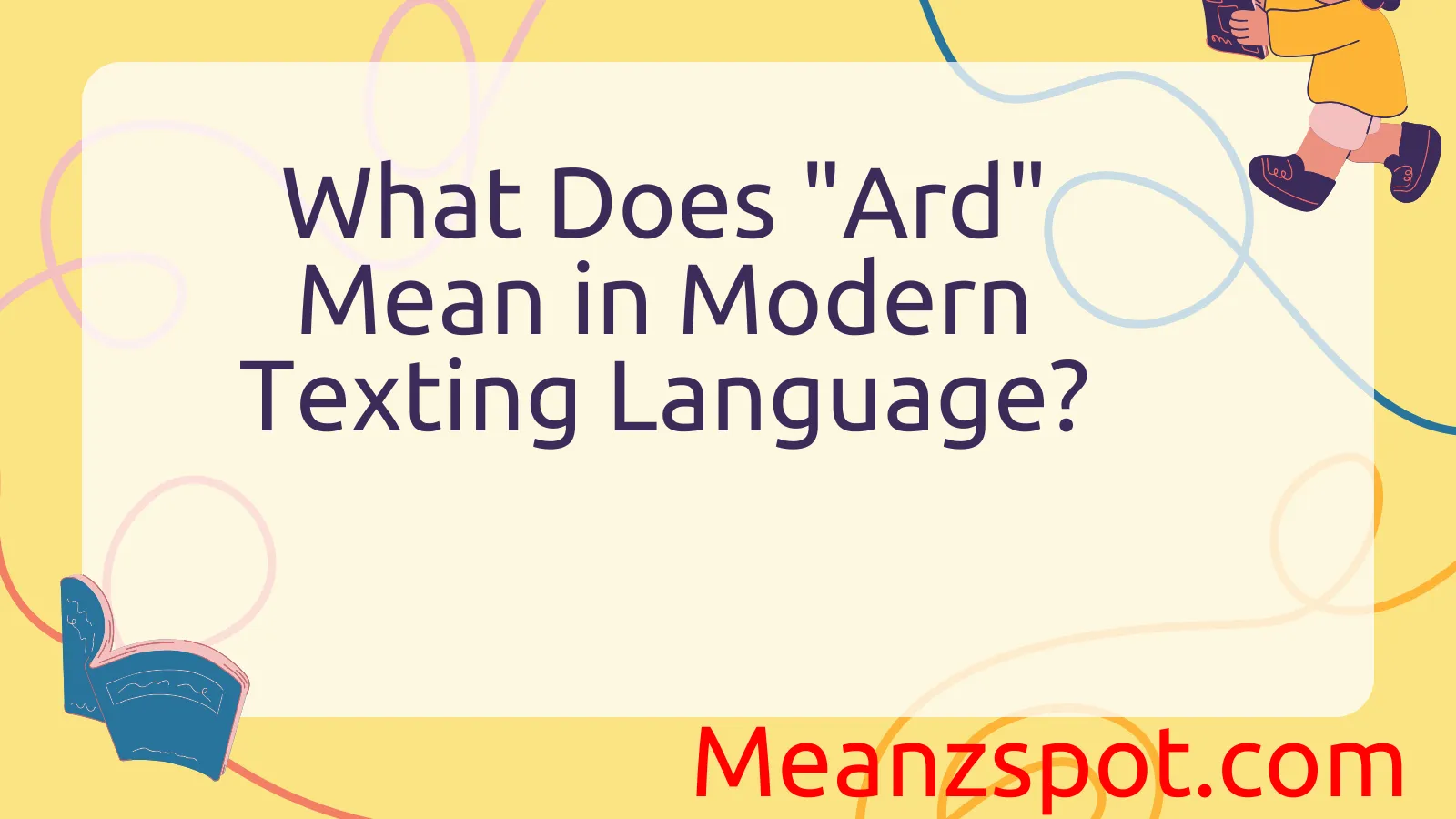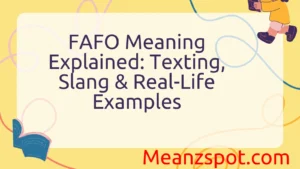Texting is full of slang and shortcuts, and one term you might have seen is “Ard.” If you’re scratching your head wondering what it means, you’re not alone. In modern texting language, Ard is simply a quick way of saying “alright.” It’s a casual reply people use in chats, similar to saying okay, cool, or got it.
You’ll often spot it on Snapchat, Instagram, or everyday text messages when someone wants to keep things short and chill. Understanding this slang makes it easier to follow conversations and respond naturally in today’s fast-paced digital world.
Definitions & Meaning
In text conversations, “ard” is an informal shorthand commonly used to mean “alright” or “okay.” It’s a phonetic spelling that reflects how “alright” is pronounced in some regional dialects, particularly in parts of the United States like Philadelphia and the East Coast.
For example:
- Person A: “Yo, you coming through later?”
- Person B: “Ard, I’ll be there.”
In this exchange, “ard” is used to affirm or agree, much like saying “okay” or “sure.” It often conveys a laid-back tone, suggesting a casual agreement or acknowledgement.
Some other interpretations of “ard” might be:
- A simple affirmative: “Yes” or “I understand.”
- A placeholder to end a conversation without saying much: “Ard, cool.”
Importantly, “ard” is typically used in informal settings. It’s not standard English and wouldn’t be appropriate in professional emails or formal writing. Its usage is mainly reserved for texts, instant messages, and social media posts, especially among younger people or those from urban communities where this slang is more embedded in everyday language.
Origins & History
The slang term “ard” has roots in African American Vernacular English (AAVE) and urban dialects, particularly in cities like Philadelphia and Baltimore. It is a prime example of phonetic spelling—where the word is written the way it sounds when spoken in a specific accent or dialect.
In these communities, “alright” is often pronounced quickly and with less emphasis on the initial syllable, sounding more like “aight” or “ard.” Over time, this phonetic version made its way into written form through text messaging, social media, and online forums.
The rise of texting culture in the early 2000s—especially with the limitations of character count on platforms like SMS and Twitter—encouraged more users to adopt shorthand expressions. “Ard” fit perfectly into this trend: short, expressive, and easy to type.
While not widespread in formal speech or writing, the term is a small piece of a broader linguistic trend where regional and cultural dialects shape the evolution of English in the digital space.
Usage in Different Contexts
1. Social Media & Text Messaging:
The most common use of “ard” is in casual text messages or social media comments. It’s often a quick way to confirm something or show understanding.
Example:
- Friend 1: “Wanna hit the gym at 5?”
- Friend 2: “Ard, see you then.”
2. Pop Culture & Music:
“Ard” is sometimes heard in music, especially hip-hop or rap, where slang is a major part of lyrical identity. Artists from cities like Philadelphia may include “ard” in lyrics or interviews, showcasing their local vernacular.
3. Online Gaming:
In multiplayer games or streaming chats, players may use “ard” to signal agreement or readiness.
Example:
- “We dropping at Tilted Towers?”
- “Ard, let’s go.”
4. Regional Usage:
“Ard” is not universally used. While it may be common in Philadelphia or New York slang, someone from another region might not recognize it. This creates a form of in-group language that builds community among users from similar backgrounds.
5. Humorous or Sarcastic Tones:
Depending on the context, “ard” can also be used sarcastically or passively, especially in online debates.
Example:
- “You always think you’re right.”
- “Ard.” (meaning: I’m done arguing.)
Common Misunderstandings & Clarifications
Because “ard” is not standard English, it’s often misinterpreted. Here are a few common misunderstandings:
- It’s Not a Typo: Some might assume it’s a misspelling of “hard” or “card,” but it’s intentional.
- It Doesn’t Always Mean Enthusiastic Agreement: While “ard” can mean “okay,” it doesn’t always imply excitement. Tone matters and is often interpreted based on context.
- Not Universally Recognized: People outside urban or youth culture might not understand it, leading to confusion in mixed-age or cross-cultural conversations.
- Not Formal or Professional: “Ard” should not be used in emails to your boss or in academic writing. It’s strictly casual.
Understanding these nuances helps prevent communication breakdowns and avoids misjudging the speaker’s intent.
Alternatives & Synonyms
If you’re not comfortable using “ard” or want to vary your language, there are several alternatives depending on the context:
- Alright: The standard, full-form version.
- Okay / OK / K: Universally accepted and more neutral.
- Cool: A relaxed and informal way to show agreement.
- Bet: Popular in youth slang, especially in African American communities.
- Sure: Slightly more formal, but still casual.
- Got it: Acknowledges understanding.
- No problem: Used when responding to requests or tasks.
Each of these alternatives can replace “ard” in most contexts, though some may carry different tones—from enthusiastic to indifferent.
Frequently Asked Questions (FAQ)
1. Is “ard” a real word?
Not in the dictionary sense. It’s slang, a phonetic spelling of “alright,” and isn’t considered standard English.
2. Where is “ard” most commonly used?
It’s mostly used in urban areas like Philadelphia and sometimes Baltimore. It appears in text conversations and on social media platforms.
3. Can I use “ard” in a professional setting?
No. “Ard” is informal and should be avoided in formal or professional communications.
4. Does “ard” always mean “alright”?
Most of the time, yes. But it can also be used passively or sarcastically depending on tone and context.
5. How do you pronounce “ard”?
It’s pronounced like a clipped version of “alright,” sounding something like “aahd” or “ard.”
6. Is “ard” the same as “aight”?
They are similar in meaning and usage, but “aight” is more directly derived from “alright,” while “ard” has regional phonetic influences.
7. Is “ard” only used by young people?
Primarily, yes. It’s more common among younger demographics familiar with urban slang or social media trends.
Conclusion
Understanding what “ard” means in text conversations provides insight into how language evolves in the digital age. Originating from regional dialects and popularized through texting and social media, “ard” is a casual, phonetic shorthand for “alright” that reflects both cultural identity and linguistic creativity. While it’s not a word you’d use in a professional setting, it’s a helpful expression to know if you want to stay current with informal communication styles, particularly in urban or youth-centered contexts.
Recognizing terms like “ard” helps bridge gaps in understanding between different generations, regions, and communities. So next time you see someone reply with “ard,” you’ll know exactly what they mean.



